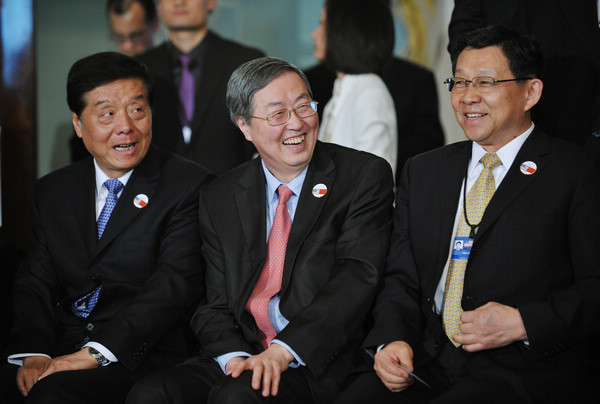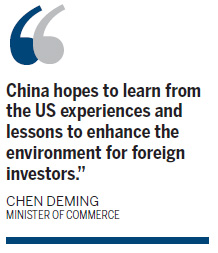Foreign and Military Affairs
Bilateral talks likely to yield dozens of deals
Updated: 2011-05-11 07:08
By Li Xing (China Daily)
 Minister of Commerce Chen Deming (right) and Bank of China Governor Zhou Xiaochuan smile while taking their places for the China-US Strategic and Economic Dialogue group photo at the State Department in Washington on Monday. [Photo/Agencies] |
WASHINGTON - Dozens of deals and agreements were expected to be reached by the countries' top officials during the last day of the third round of the China-US Strategic and Economic Dialogue in the US capital, said Minister of Commerce Chen Deming.
Chinese analysts believe that industries including space, aviation and energy possess significant potential and deeper cooperation between the two countries is likely to ensure the sectors play a large role in increased bilateral trade.
As co-chairs of the economic track of the talks, Vice-Premier Wang Qishan and US Treasury Secretary Timothy Geithner opened Monday's talks by laying down the priorities of each country.
 |
China "hopes that the US will set a clear timetable and roadmap for implementing the dialogue outcomes, take credible steps to relax high-tech export controls vis--vis China, recognize China's market economy status, accord fair treatment to Chinese companies investing in the US and refrain from politicizing economic and trade issues," Wang said.
The US set three priorities for the talks, which included pushing for China to make its currency exchange rate more flexible, moving ahead with financial sector reforms and enabling US businesses to compete on the same footing as local businesses in China.
Both countries have the potential to open up new investment opportunities, Chen said, adding that the nations can expand cooperation in such service sectors as finance, education, sports and medicine.
The nations can also explore new and in-depth collaborations in energy, environment, biology, information, tourism, new materials, space and aviation, he said.
On the first day of the dialogue, delegates focused on how to promote healthy bilateral trade, improve the investment environment in each country, explore new areas of bilateral cooperation and enhance collaborations on global and multilateral issues, said Chen, who made a keynote speech during the economic track.
They also discussed how other financial reforms would put more money into the hands of Chinese consumers as China pushes for a more consumption-led economy.
Tuesday's talks in the economic track will focus on rebalancing both economies and strengthening recoveries, Chen said.
High-tech exports
During Monday's talks, the US asked China to standardize and regulate its government procurement measures at the local level to "de-link" its innovation policies from government procurement.
China stressed that many US firms have lost business opportunities and market share in China as a result of the US government imposing controls on high-tech exports to China.
"It is not fair for China and for US businesses," Chen told the media.
The US has imposed restrictions on more than 2,000 items, with mandatory requirements to clarify the end-user and end-use in China before US manufacturers can export such items to China, Chen explained.
The US has excluded China from its new exports license exception, dubbed the Strategic Trade Authorization, which has granted access to 164 countries.
China has stressed many times that its imports from the US are set to rise sharply and that bilateral trade will be more balanced if the invisible loss can be avoided by lifting the controls the US has put on high-tech exports to China.
National security
The US also questioned China's new national security review of foreign direct investment, which began in April.
Chen said China will make sure that its security review process is "open and transparent".
Beijing adopted the new security review regime to safeguard China's national security, he said, adding that China "looks at the US as a teacher" in developing national security systems.
China also asked the teacher to do the same: to make its security reviews of Chinese firms conducting business in the US transparent and fair.
The Committee on Foreign Investment in the US, a group headed by the Treasury Department with members from the defense and intelligence departments, conducts regular screenings of Chinese firms trying to expand into the US through mergers and acquisitions.
Chen said quite a few Chinese firms have failed to pass the committee's review. Two years ago, an electronic products supplier was told that it could acquire a small US electronics firm, but two years later, it was told to "withdraw".
While declining to name names so as not to affect these firms' businesses in the US, Chen said the committee has failed to divulge how it conducted its review in a transparent and fair manner.
Chen admitted that China lacks experience in carrying out its new security review regime.
Both nations should show flexibility and seal the agreement on a bilateral investment treaty, he said.
"China hopes to learn from the US experiences and lessons to enhance the environment for foreign investors," Chen said.
E-paper

War of the roses
European Chinese rose growers are beating their Chinese rivals at their own game
High-tech park gets big boost
At the source
Merchant of Venice
Specials

Sino-US Dialogue
China and the US hold the third round of the Strategic and Economic Dialogue on May 9-10 in Washington.

Drunk driving
Drunk drivers face a detention for one to six months and a revokation of their drivers' license.

V-Day parade
A military parade marking the 66th anniversary of the Soviet victory over Nazi.




